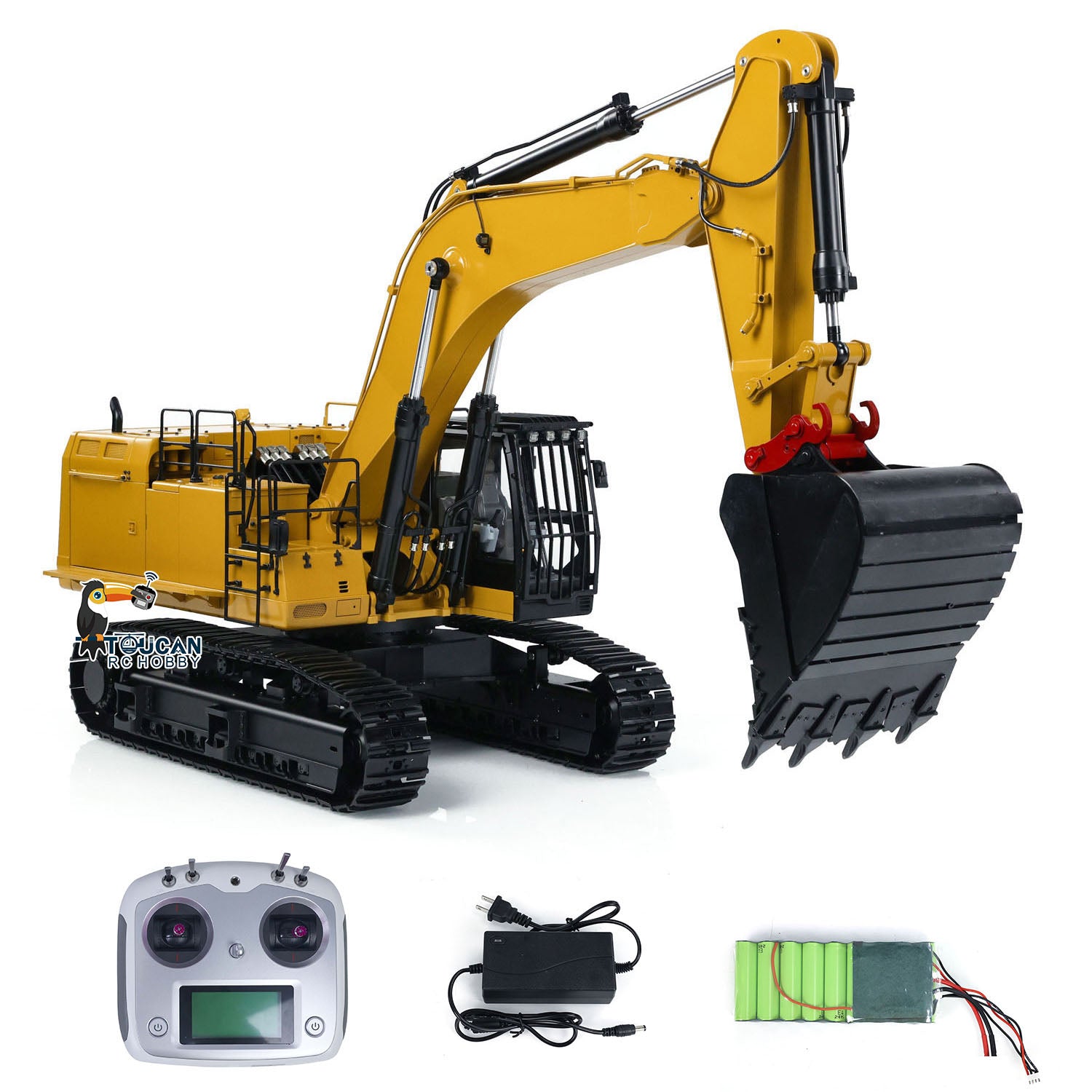Can a rc excavator Save You Time and Money? Here’s How
Recognizing Exactly How Excavator Functions and Its Influence On Efficiency
Excavators play an essential function in building and construction and mining operations, relying upon an intricate interplay of hydraulic and mechanical systems. Their ability to do a variety of tasks rests on both their layout and the modern technology integrated within. Recognizing these components can significantly affect functional effectiveness and efficiency. As improvements remain to reshape the sector, one need to think about just how these changes will certainly affect future methods and efficiency.
The Fundamentals of Excavator Mechanics

The Role of Hydraulic Solutions in Excavators
At the heart of excavator procedure exists the hydraulic system, which plays an essential duty in powering the machine's motions and features. This system uses pressurized hydraulic fluid to transfer energy, allowing numerous activities such as lifting, digging, and swinging. By using the concepts of hydraulics, excavators can carry out jobs with remarkable precision and pressure, boosting overall functional efficiency.The hydraulic system consists of crucial components, including pumps, shutoffs, and cyndrical tubes, which work together to control the flow and instructions of the liquid. When the operator engages the controls, the hydraulic fluid is guided to particular cylinders, converting the driver's commands right into physical motion. This system enables receptive and smooth actions, which are necessary in building and construction and excavation environments. double e volvo rc excavator. The effectiveness of the hydraulic system directly impacts the productivity and versatility of the excavator, making it a vital aspect in contemporary excavation processes
Key Elements of an Excavator
Comprehending the essential elements of an excavator is important for realizing just how this effective equipment operates. An excavator includes numerous substantial components, consisting of the undercarriage, residence, bucket, arm, and boom. The undercarriage gives security and flexibility, commonly including wheels or tracks to browse various surfaces. Your house has the engine and hydraulic systems, allowing the driver to regulate activity and power the device. The boom extends from the residence, allowing vertical reach, while the arm attaches to the container, helping with excavating and lifting operations.Additionally, the cab houses the driver, furnished with controls for specific handling. Each of these parts plays a crucial function in the excavator's total capability, adding to its performance and effectiveness on building and construction sites. Comprehending these components assists in maximizing and preserving excavator performance, making sure tasks are finished securely and effectively.
Add-on Flexibility and Its Benefits
Add-on adaptability is a vital aspect of excavators, allowing operators to switch over between numerous devices tailored for certain tasks. This adaptability not only boosts work effectiveness but also adds to cost-effectiveness by minimizing the demand for several makers. Understanding the different kinds of add-ons readily available can considerably influence the total efficiency and capability of an excavator on work websites.
Kinds of Accessories
While excavators are largely recognized for their digging capacities, their real versatility depends on the broad range of attachments readily available. These attachments improve the excavator's performance, allowing it to do various tasks past excavation. Typical attachments include pails (for digging and scooping), hydraulic thumbs (for comprehending materials), and augers (for piercing openings) Grapples are utilized for dealing with and relocating debris, while rippers can separate difficult surface areas. Various other specialized accessories, such as trenchers and plows, enable excavators to adjust to details work demands. This variety not just increases the equipment's energy throughout different fields, including landscaping, demolition, and building, yet likewise allows operators to tailor their devices to fulfill certain project needs successfully.
Raised Work Efficiency
Maximizing work performance is a primary advantage of utilizing numerous excavator add-ons. Various accessories enable an excavator to carry out numerous tasks without needing to switch over devices, saving useful time and labor. As an example, using a hydraulic hammer can damage concrete while a container attachment can excavate dirt, enabling a seamless process. This adaptability minimizes downtime associated with equipment modifications and boosts efficiency on-site. Furthermore, specialized attachments improve accuracy in tasks such as grading or landscape design, bring about higher high quality end results. The capability to adjust to various task needs not only improves operations however additionally lessens the requirement for additional equipment, making sure that tasks are finished promptly and successfully. Overall, attachment adaptability significantly adds to increased work efficiency in excavation work.
Cost-Effectiveness and Adaptability
Cost-effectiveness is a significant benefit of making use of functional excavator add-ons. These accessories allow a solitary excavator to perform multiple tasks, lowering the requirement for additional machinery and labor - double e volvo rc excavator. By switching in between pails, hammers, and grapples, drivers can deal with numerous projects, from excavating to demolition, consequently taking full advantage of devices application. This versatility not only lowers functional prices yet additionally decreases downtime connected with changing equipment. In addition, the capability to personalize excavators with specialized attachments enhances performance, as they can successfully handle diverse jobs according to project needs. In conclusion, the combination of cost-effectiveness and versatility in excavator attachments contributes to enhanced operational efficiency and source allowance in building and excavation tasks

Advanced Technology in Modern Excavators
Modern excavators are increasingly geared up with innovative technology that transforms excavation procedures. Automation improves operations, while boosted fuel efficiency minimizes functional prices. Additionally, wise control systems enhance precision and safety, noting a significant evolution in excavation tools.
Automation in Excavation Processes
As excavation technology advances, automation has actually become an important part in improving performance and accuracy on work websites. Modern excavators are outfitted with sophisticated automated systems that facilitate tasks such as grading, excavating, and trenching with marginal operator treatment. These systems make use of sensing units, GPS, and artificial intelligence formulas to ensure precise placing and depth control, substantially reducing the margin for mistake. In addition, automation enables operators to focus on critical decision-making as opposed to hand-operated controls, bring about improved efficiency generally. Such technologies not only improve process but additionally improve security check here by minimizing human error in intricate procedures. As a result, the assimilation of automation in excavation processes stands for a substantial development in building and construction modern technology, driving the market towards greater performance and effectiveness.
Enhanced Gas Effectiveness
Developments in technology have likewise brought about significant renovations in fuel performance for contemporary excavators. Modern makers are outfitted with sophisticated engines that enhance power result while lowering fuel consumption. These engines utilize cutting-edge combustion innovations, such as turbocharging and straight gas injection, to enhance efficiency and performance. Additionally, lightweight products in building and construction reduce total weight, allowing for much less power expenditure during procedure. The intro of variable rate controls allows drivers to change engine efficiency according to particular jobs, additionally reducing gas use. As a result, these enhancements not only reduced operational expenses however also add to ecological sustainability by lowering emissions. On the whole, enhanced fuel performance in excavators is a vital advancement that boosts efficiency and economic viability in the building and construction market.
Smart Control Solution
While drivers navigate significantly intricate task sites, smart control systems in excavators have emerged as necessary tools for boosting performance and accuracy. These innovative modern technologies make use of formulas and sensing units to keep track of numerous parameters such as load weight, terrain problems, and operational efficiency. By immediately readjusting hydraulic features, smart systems enhance equipment efficiency, causing boosted productivity and lowered endure components. Additionally, drivers gain from intuitive interfaces that give real-time responses and diagnostics, enabling notified decision-making. This assimilation of technology not just simplifies procedures yet additionally reduces human mistake, contributing to safer work environments. click this site As the building and construction industry remains to progress, smart control systems will play a vital function fit the future of excavator effectiveness and efficiency.
Enhancing Functional Effectiveness With Excavators
Excavators play a vital duty in boosting functional effectiveness throughout different building and construction and excavation tasks. Their convenience enables multiple tasks, consisting of material, excavating, and training handling, which enhances workflows and reduces the demand for extra equipment. With effective hydraulic systems, excavators can execute sturdy jobs with precision, significantly decreasing the moment required to complete tasks. The integration of sophisticated innovation, such as general practitioner and automated controls, additionally enhances their procedure, making it possible for operators to achieve better accuracy and reduce material waste. Furthermore, modern excavators are developed to take in less gas and lessen emissions, adding to both cost savings and ecological sustainability. By making use of excavators successfully, building groups can enhance efficiency, fulfill job deadlines, and enhance general website administration. This multifunctionality and effectiveness make excavators essential devices in the modern building and construction landscape.
The Future of Excavators in Building and Mining Industries
As the construction and mining industries evolve, the future of excavators is poised for substantial improvement driven by technological development and changing operational demands. Breakthroughs in automation and expert system are reshaping excavator capacities, enabling enhanced precision and performance in operations. Self-governing excavators are emerging, decreasing the demand for human intervention and decreasing the threat of accidents.Moreover, the assimilation of telematics and IoT innovation allows real-time tracking of device performance and anticipating maintenance, optimizing uptime. Environmentally friendly designs, including electrical and hybrid versions, are gaining traction, lining up with sustainability objectives within the industry.Additionally, making use of advanced materials and lighter styles enhances fuel performance while preserving efficiency requirements. As these fads progression, excavators will play an essential duty in satisfying the raising needs for efficiency and security in building and construction and mining, inevitably transforming functional landscapes.
Often Asked Concerns
Exactly How Do Weather Affect Excavator Performance?

Climate condition greatly affect excavator efficiency, as rain and mud can prevent grip and security, while severe useful source temperatures may impact hydraulic systems. Operators must adapt to these variables to assure suitable functionality and safety and security throughout operations.
What Precaution Should Operators Comply With While Making Use Of Excavators?
Precaution for excavator operators consist of putting on suitable individual protective equipment, conducting pre-operation examinations, making certain proper communication with ground employees, preserving a risk-free range from overhanging hazards, and adhering to well established operational methods to protect against crashes.
How Typically Should Excavators Be Preserved for Ideal Performance?
Excavators ought to be maintained frequently to guarantee peak performance, normally every 250 operating hours or as specified by the supplier. Regular checks enhance reliability, prevent unanticipated failures, and expand the life expectancy of the tools.
What Is the Typical Life-span of an Excavator?
The typical life expectancy of an excavator normally varies from 10,000 to 15,000 hours of procedure. Elements influencing long life include maintenance techniques, running conditions, and the top quality of the machine itself, influencing total efficiency and performance.

Can Excavators Operate Uneven Terrain Successfully?
Excavators can operate effectively on irregular terrain due to their articulated layouts and adjustable tracks. These attributes enable them to maintain security and grip, enabling efficient operation in tough settings frequently run into in construction and landscape design tasks. Each of these elements plays a vital function in the excavator's general functionality, contributing to its effectiveness and performance on building and construction websites. Making the most of task effectiveness is a main benefit of utilizing various excavator accessories. While operators navigate increasingly complicated job sites, smart control systems in excavators have emerged as vital tools for improving effectiveness and accuracy. Excavators play an important role in improving functional efficiency across different building and excavation jobs. Advancements in automation and man-made knowledge are improving excavator abilities, allowing for improved precision and effectiveness in procedures.